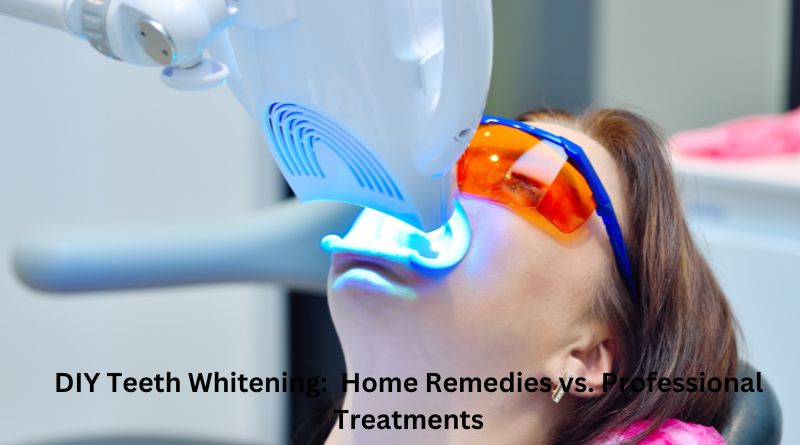Many people are on the search for brighter, whiter teeth and if you’re considering whitening your teeth, you have a variety of options to choose from. There are easily accessible, cheaper DIY home teeth whitening options, some with no need for chemicals, as well as professional teeth whitening options either available over the counter or at your dentist. We’re going to take a look at some of the various teeth whitening methods, including how safe and effective they really are.
Home Remedies for Teeth Whitening
- Baking Soda and Hydrogen Peroxide
How it Works: Baking soda is mildly abrasive and can help scrub away surface stains. Hydrogen peroxide acts as a bleaching agent.
Method: Create a paste with baking soda and hydrogen peroxide, then brush your teeth with it for a minute or two.
Effectiveness: This method can gradually lighten teeth, but don’t expect dramatic results overnight.
Safety: Safe if used occasionally, but frequent use can wear down enamel and irritate gums.
- Coconut Oil Pulling
How it Works: Swishing coconut oil in your mouth can reduce bacteria and plaque, potentially leading to whiter teeth.
Method: Swish a tablespoon of coconut oil in your mouth for 10-20 minutes each day.
Effectiveness: While it might improve overall oral hygiene, its whitening effects are subtle.
Safety: Safe and gentle, with no notable risks if done properly.
- Apple Cider Vinegar
How it Works: The acetic acid in apple cider vinegar helps break down plaque and stains.
Method: Dilute apple cider vinegar with water and use it as a mouthwash or brush your teeth with it briefly.
Effectiveness: It can remove some surface stains, but its effectiveness is questionable.
Safety: Can erode enamel if used too often, making teeth more sensitive.
- Activated Charcoal
How it Works: Activated charcoal binds to stains and removes them from the surface of your teeth.
Method: Brush your teeth gently with activated charcoal powder for a couple of minutes, then rinse thoroughly.
Effectiveness: Good for removing surface stains, but not for a long-term whitening solution.
Safety: Safe for occasional use, but can be abrasive if used too frequently.
Professional Teeth Whitening Treatments
- In-Dentist Whitening
How it Works: A high-concentration bleaching agent is applied to your teeth, often enhanced with a special light.
Procedure: Takes about an hour, with immediate results.
Effectiveness: Extremely effective, often whitening teeth by several shades in one visit.
Safety: Safe under professional supervision, though you might experience temporary sensitivity.
- Take-Home Whitening Kits from Dentists
How it Works: Custom-fitted trays and a professional-grade whitening gel are provided for at-home use.
Procedure: Wear the trays daily for a specified period, usually over one to two weeks.
Effectiveness: Very effective, providing gradual, even whitening.
Safety: Safe when used as directed, with minimal risk of irritation.
- Over-the-Counter Whitening Strips and Gels
How it Works: These products contain lower concentrations of whitening agents.
Procedure: Apply the strips or gels as directed, typically for 1-2 weeks.
Effectiveness: Moderately effective, results will vary based on the product you choose and how oftern you use it.
Safety: Generally safe, but excessive use can lead to sensitivity and gum irritation.
Comparing Safety and Effectiveness
Effectiveness:
Professional Treatments: Offer the most significant and long-lasting results due to stronger bleaching agents and precise application.
Home Remedies: Best for minor surface stains and gradual improvement. Results vary widely and are usually less pronounced.
Safety:
Professional Treatments: Safest when performed by a dentist, ensuring controlled application and minimising risks.
Home Remedies: Generally safe when used correctly, but misuse can lead to enamel damage and sensitivity.
DIY Teeth Whitening Vs Professional
Whether you choose a DIY approach or opt for professional treatment depends on your desired results, budget, and sensitivity levels. Home remedies can be a cost-effective way to maintain your smile and handle minor stains. However, for more dramatic results and guaranteed safety, professional treatments are the best bet. Always consult your dentist before starting any whitening regimen to ensure it’s right for you.

